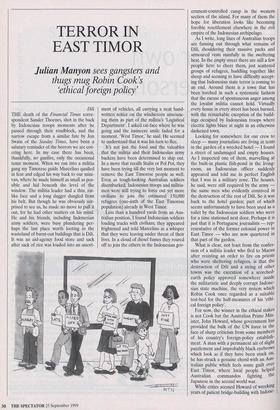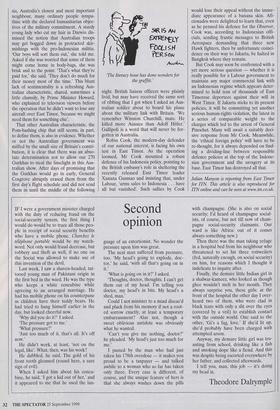TERROR IN EAST TIMOR
Julian Manyon sees gangsters and
thugs mug Robin Cook's `ethical foreign policy'
Dili THE death of the Financial Times corre- spondent Sander Thoenes, shot in the back by Indonesian troops moments after he passed through their roadblock, and the narrow escape from a similar fate by Jon Swain of the Sunday Times, have been a salutary reminder of the horrors we are cov- ering here. In my case there has been, thankfully, no gunfire, only the occasional tense moment. When we ran into a militia gang my Timorese guide Marcelino quailed in fear and edged his way back to our mini- van, where he made himself as small as pos- sible and hid beneath the level of the window. The militia leader had a thin, rat- like face and a long dagger dangled from his belt. But though he was obviously sur- prised to see us, he made no move to pull it out, for he had other matters on his mind. He and his friends, including Indonesian army soldiers, were busy plundering per- haps the last place worth looting in the wasteland of burnt-out buildings that is Dili. It was an aid-agency food store and sack after sack of rice was loaded into an assort- ment of vehicles, all carrying a neat hand- written notice on the windscreen announc- ing them as part of the militia's 'Logistical Department'. I asked rat-face where he was going and the insincere smile faded for a moment. 'West Timor,' he said. He seemed to understand that it was his turn to flee.
It's not just the food and the valuables that the militia and their Indonesian army backers have been determined to ship out. In a move that recalls Stalin or Pol Pot, they have been trying till the very last moment to remove the East Timorese people as well. Even as tough-looking Australian soldiers disembarked, Indonesian troops and militia- men were still trying to force out yet more 'civilians to join the estimated 150,000 refugees (one-sixth of the East Timorese population) already in West Timor.
Less than a hundred yards from an Aus- tralian position, I found Indonesian soldiers loading trucks with civilians; they appeared frightened and told Marcelino in a whisper that they were leaving under threat of their lives. In a cloud of diesel fumes they roared off to join the others in the Indonesian gov- ernment-controlled camp in the western section of the island. For many of them the hope for liberation looks like becoming forcible resettlement elsewhere in the evil empire of the Indonesian archipelago.
As I write, long lines of Australian troops are fanning out through what remains of Dili, shouldering their massive packs and armoured vests manfully in the sweltering heat. In the empty street there are still a few people here to cheer them, just scattered groups of refugees, huddling together like sheep and seeming to have difficulty accept- ing that Indonesian state terror is coming to an end. Around them is a town that has been torched in such a systematic fashion that the excuse of spontaneous anger among the loyalist militia cannot hold. Virtually every house in every street has been burned, with the remarkable exception of the build ings occupied by Indonesian troops where electric lights blaze at night in an otherwise darkened town.
Looking for somewhere for our crew to sleep — many journalists are living in tents in the garden of a wrecked hotel — I found a street of undamaged and empty houses. As I inspected one of them, marvelling at the built-in plastic fish-pond in the living- room, an Indonesian officer suddenly appeared and told me in perfect English that I was in a military zone. The houses, he said, were still required by the army the same men who evidently connived in the destruction of the rest of Dili. So it was back to the hotel garden; part of which seems unfortunately to have been used as a toilet by the Indonesian soldiers who were for a time stationed next door. Perhaps it is just that it is Portuguese journalists — rep- resentative of the former colonial power in East Timor — who are now quartered in that part of the garden.
What is clear, not least from the confes- sion of a militia leader who fled to Macau after resisting an order to fire on priests who were sheltering refugees, is that the destruction of Dili and a string of other towns was the execution of a scorched- earth policy approved somewhere inside the militaristic and deeply corrupt Indone- sian state machine, the very system which Robin Cook once regarded as a suitable test-bed for the half-measures of his 'ethi- cal foreign policy'. For now, the winner in the ethical stakes is not Cook but the Australian Prime Min- ister, John Howard, whose government has provided the bulk of the UN force in the face of sharp criticism from some members of his country's foreign-policy establish- ment. A man with a permanent air of slight puzzlement and improbably black eyebrows which look as if they have been stuck on, he has struck a genuine chord with an Aus- tralian public which feels some guilt over East Timor, where local people helped Australian commandos fighting the Japanese in the second world war. While critics accused Howard of wrecking years of patient bridge-building with Indone- sia, Australia's closest and most important neighbour, many ordinary people sympa- thise with the declared humanitarian objec- tives of the military commitment. A sturdy young lady who cut my hair in Darwin dis- missed the notion that Australian troops may get bogged down in protracted skir- mishings with the pro-Indonesian militia. `Our boys will sort them out,' she told me. Asked if she was worried that some of them might come home in body-bags, she was brisk and to the point: 'That's what they're paid for,' she said. 'They don't do much for their money most of the time.' This blunt lack of sentimentality is a refreshing Aus- tralian characteristic, shared, sometimes a little clumsily, by Prime Minister Howard, who explained to television viewers before the operation that he didn't want to lose any aircraft over East Timor, 'because we might need them for something else'.
That other Australian characteristic, the Porn-bashing chip that still seems, in part, to define them, is also in evidence. Whether or not the Australian government was miffed by the small size of Britain's contri- bution, it is clear that there was an abso- lute determination not to allow our 270 Gurkhas to steal the limelight in this Aus- tralian show. After days of promising that the Gurkhas would go in early, General Cosgrove abruptly erased them from the first day's flight schedule and did not send them in until the middle of the following `The literacy hour has done wonders for the graffiti.'
night. British liaison officers were plainly livid, but may have received the same sort of ribbing that I got when I asked an Aus- tralian soldier about to board his plane about the military link with Britain. 'We remember Winston Churchill, mate. He killed more Aussies than Adolf Hitler.' Gallipoli is a word that will never be for- gotten in Australia.
Robin Cook, the modern-day defender of our national interest, is facing his own test in East Timor. As the operation loomed, Mr Cook mounted a robust defence of his Indonesia policy, pointing to the British embassy's role in sheltering the recently released East Timor leader Xanana Gusmao and insisting that, under Labour, 'arms sales to Indonesia . have all but vanished'. Such sallies by Cook would lose their appeal without the imme- diate appearance of a banana skin. Afi- cionados were delighted to learn that, even as he penned his defence for the Observer, Cook was, according to Indonesian offi- cials, sending frantic messages to British Aerospace demanding that three new Hawk fighters, then by unfortunate coinci- dence on their way to Jakarta, be halted in Bangkok where they remain.
But Cook may soon be confronted with a yet more serious question — whether it is really possible for a Labour government to maintain any major commercial link with an Indonesian regime which appears deter- mined to hold tens of thousands of East Timorese deportees against their will in West Timor. If Jakarta sticks to its present policies, it will be committing yet another serious human-rights violation, the latest in a series of comparable weight to the charges which led to the arrest of General Pinochet. Many will await a suitably deci- sive response from Mr Cook. Meanwhile, the 'ethical foreign policy' will have to be re-thought, for it always depended on find- ing a dividing-line between responsible defence policies at the top of the Indone- sian government and the savagery at its base. East Timor has destroyed all that.
Julian Manyon is reporting from East Timor for ITN. This article is also reproduced for ITN online and can be seen at www.itn.co.uk.



























































































 Previous page
Previous page